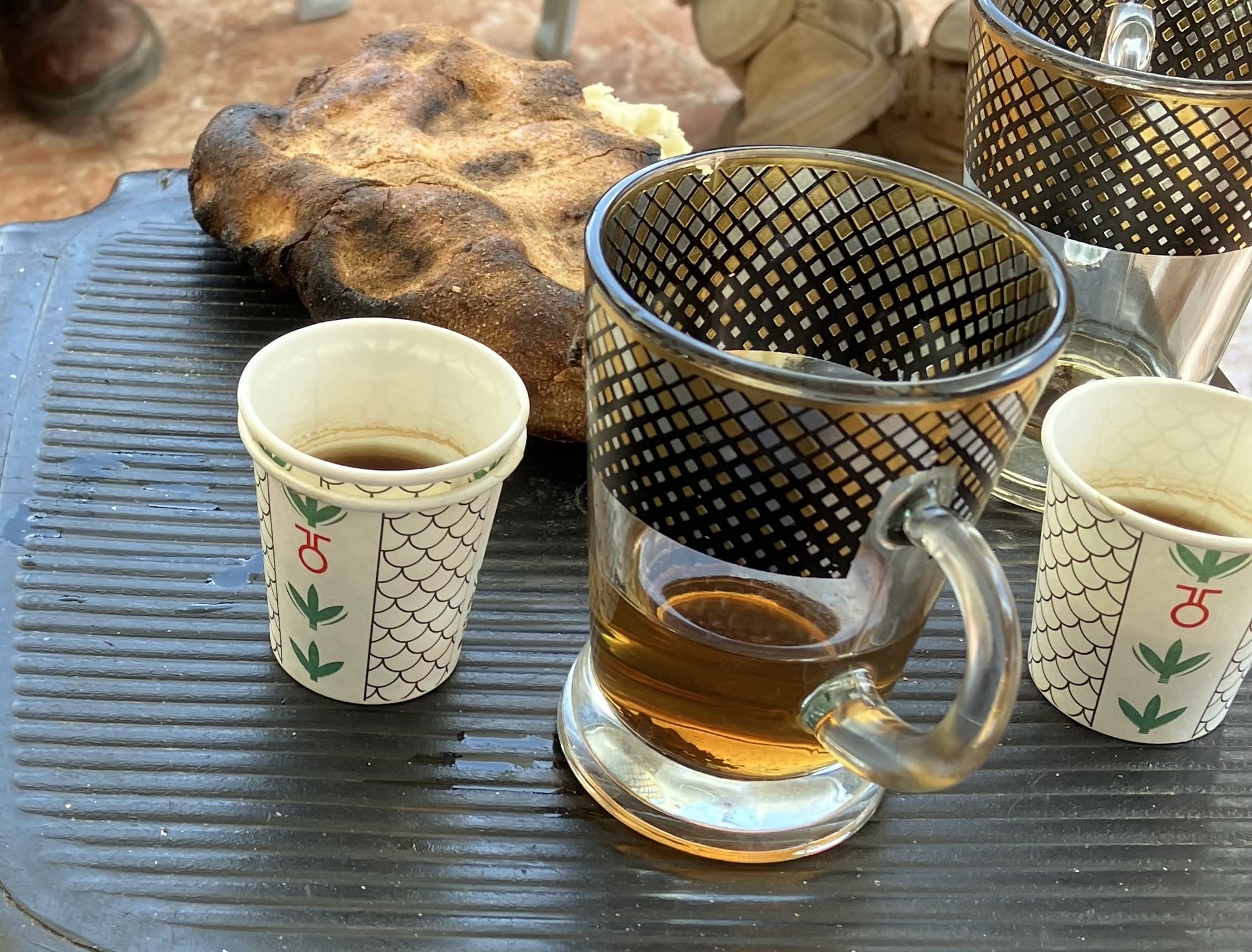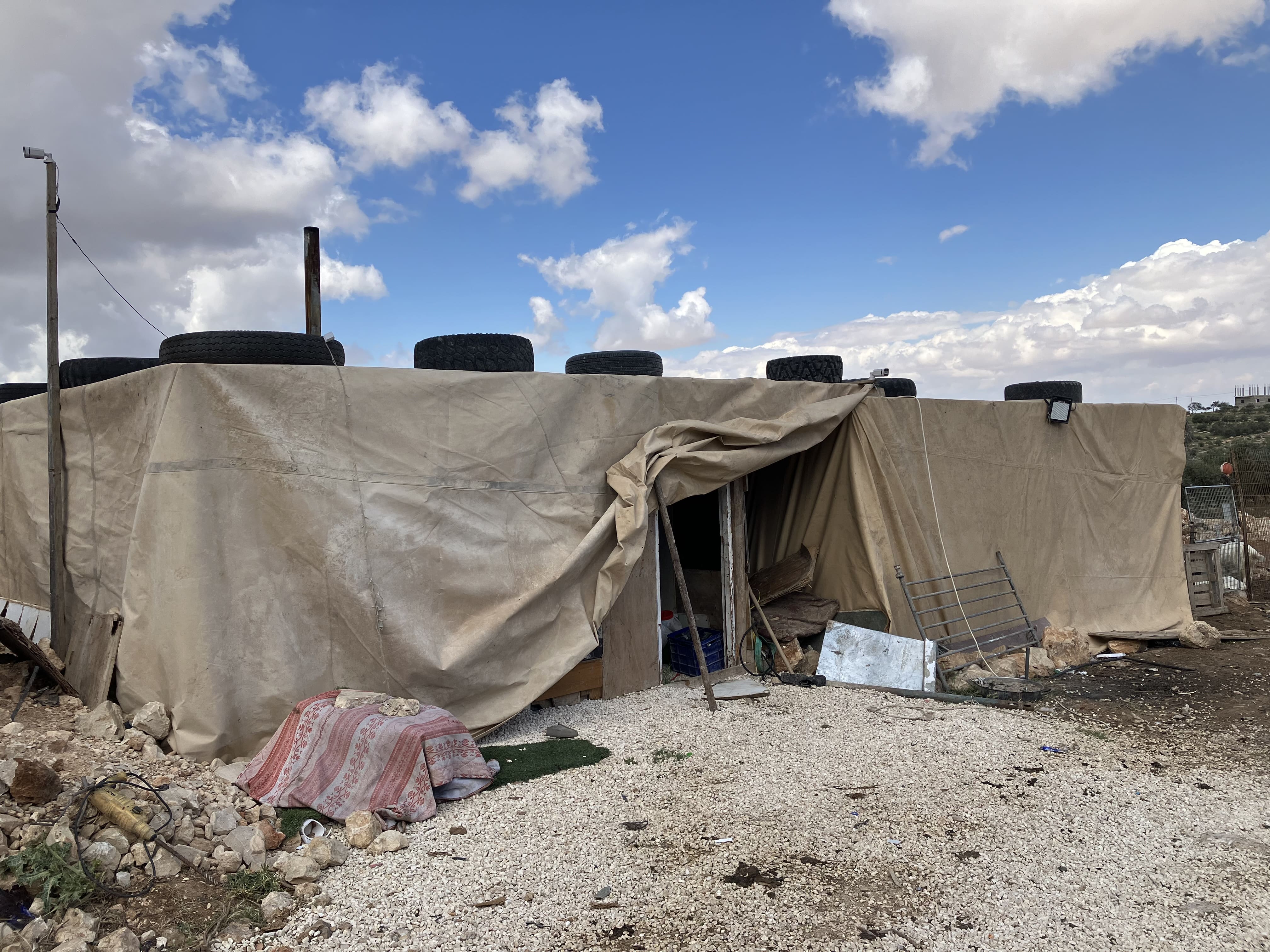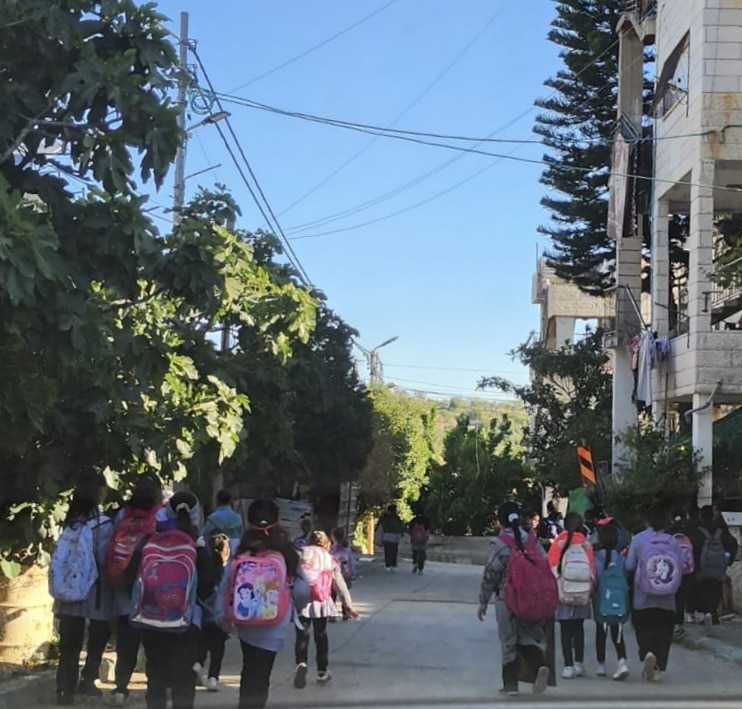‘Yesterday the settlers were here the middle of the afternoon and again at about 2am. It’s hard for the children. Imagine you are in your home and there are people outside with guns and knives and sticks. Every day. The mothers are always scared.’
Sara, Jordan Valley
Sara is a Bedouin grandmother, living in the Jordan Valley in the occupied West Bank. We were drinking the sweet mint tea she had just made as we sat talking in a semi-permanent big square tent — sitting space during the day and sleeping space at night. Her community is small, only seven families now. Many, including her daughter-in-law and grandchildren, have had to leave
‘Because we can’t protect them.’

Drinking tea
Israeli settlers from the nearby settlement constantly harass their community to drive them off the land. Grandmother Sara was tired and desperate. She sat silently for a moment and then said:
‘We have never ever seen it like this. There is no mercy. We are a peaceful people. I wish we could die together and all will be finished. A strong earthquake here, killing everyone would be better than this life. No one will help us, only God can make it better.’

A typical Bedouin tent
Sara’s story was not a one off. We heard similar stories from women in many different places and different circumstances. Sham lives with her three children in a village in the Bethlehem Governorate. Her village is large enough to have a mosque and a school – built with the assistance of international donations. But the nearby illegal settlement is steadily taking over the village’s grazing land as it expands, slowly beginning to encircle the community.
‘We have one street and every day settlers harass children going to school. They use cars against them, hit them, point guns. The children are scared.’
Sham, Bethlehem Governorate

Children going to school
While she was telling us this, a military jeep entered and drove around the village.
‘This is a daily experience. Some days it’s soldiers throwing sound bombs, and sometimes it’s settlers stealing and killing livestock. Many of the children develop psychological problems. We have interventions but the children can’t process what is happening because new things are constantly happening.’
Sham, Bethlehem Governate
Laila, a young woman studying at Bethlehem University, added:
‘Most of us have internal trauma inbuilt, most of us have PTSD and panic attacks, but we have got so used to it that we have normalised it and just get on with doing things. We were born under this situation.’
Amal, who works for the Palestinian Ministry of Education and is herself a mother to a school-aged daughter shared with us how the ministry’s data reflects the daily realities faced by families. Drawing from both her personal experience as a mother and official reports, Amal described worrying trends:
‘In the West Bank we now see an increase in the number of children asking for more locks and bolts on the door and of children returning to sleep in their parents’ beds.’
The effects of the occupation on Palestinians’ mental health is reiterated in research findings. Medical Aid for Palestinians report:
‘The policies and practices of Israel associated with the maintenance of its settlement enterprise – including constant restrictions on free movement as a result of checkpoints and barriers, harassment by settlers, regular contact with a foreign occupying military force, and demolitions of homes and livelihoods – feed pervasive experiences of humiliation, personal insecurity, and ‘feeling broken or destroyed’ among Palestinians. House raids, arrests and military detention all have serious repercussions for Palestinian children in the West Bank, and these practices are inextricably linked to the presence of settlements.’
Medical Aid for Palestinians
Israeli settlements in the West Bank are illegal under international law. In its Advisory Opinion given in July 2024 the International Court of Justice concluded that under international law Israel has an obligation to cease all new settlement activity immediately and evacuate all settlers from the occupied territory. Despite this, Israel’s current government—led by Prime Minister Benjamin Netanyahu and far-right ministers such as Bezalel Smotrich—has pursued policies to accelerate settlement growth. Smotrich stated:
‘We will not stop until the entire area receives its full legal status and becomes an inseparable part of the State of Israel.’
Bezalel Smotrich, Israel’s far-right finance minister
The Israeli government announced in August this year that it was reviving the long-frozen illegal E1 settlement plan which would split the West Bank in two and displace over 7,000 Palestinians. In May, the government also stated it would be establishing 22 new settlements in the occupied West Bank, including the legalisation of settlement outposts, which are informal settlements built without prior government permission and illegal even under Israeli law.
The International Court of Justice’s advisory opinion reaffirmed that harassment of Palestinians by settlers breaches Israel’s obligations under international law and Palestinians have the right to be safeguarded. Yet these rights are consistently breached.
As we were finishing our tea, Sara urged us:
‘Tell our story, we need the world to know the injustice. We have children who are crying, screaming in the night, running scared. Other people can go other places. We have nowhere to go, but how long can we stay?’
Sham also reflected on her hope for the future:
‘We cannot give up. I know some day things will change.’
You can be part of that change.
Take action!
1. Sign our urgent email to your elected representative asking our governments to say no to Israel’s proposed E1 major settlement plan which could split the West Bank in two and destroy the possibility of a future Palestinian state. It takes just 1 minute. Write to your MP (UK) here. Write to your TD (Ireland) here.
2. In July, the world’s highest court ruled that Israel’s occupation of all Palestinian territory was illegal and must end. Contact your MP urge your elected representatives to take decisive action to honour the findings of the court. Write to your representative UK / Ireland.
3. Join the Red Line For Gaza campaign.
4. Read more West Bank women’s stories on the Medical Aid for Palestine website.
5. Read more about the consequences of settler violence and forced displacement on Palestinian communities in the Physicians For Human Rights report.
What does international law say?

